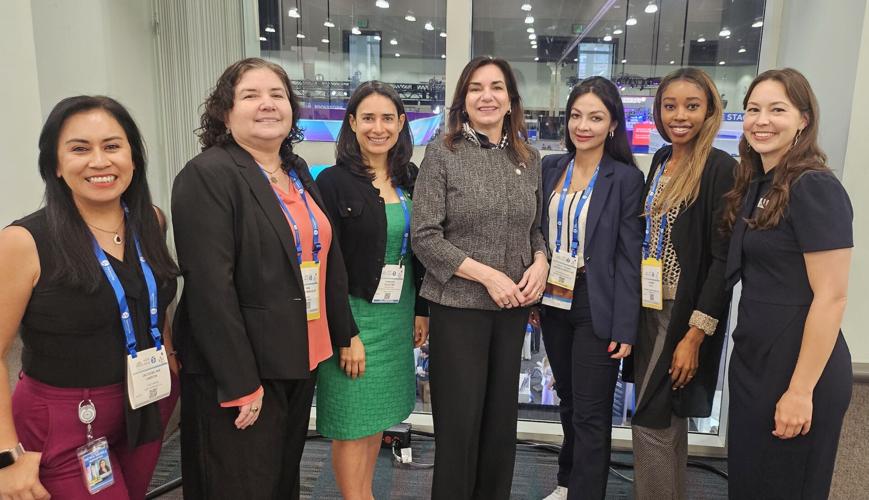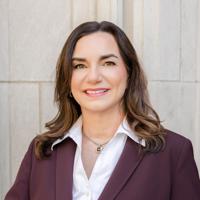
APA President Theresa M. Miskimen Rivera (center) with a group of Latinas after "Café y Conversación." (Jacqueline García)
During a conversation this past Sunday morning, a group of Latina women talked about the importance of addressing mental health among the Latino community. During the “Café y Conversación” talk with Theresa M. Miskimen Rivera, the newly elected president of the American Psychiatric Association (APA), mental health care leaders and advocates highlighted the importance of removing taboos, providing enough resources in underserved communities and the lack of psychiatrists in the United States.
The group gathered at the L.A. Convention Center during the APA’s annual meeting held from May 17 to 21. This is especially important as May is Mental Health Awareness Month.
For many communities there is uncertainty and anxiety under the current presidential administration. Many agreed that mental and emotional help is vital.
However, studies have shown that every year an estimated one in five Americans— or 60 million individuals—will experience some form of mental illness.
Additionally, more than 40 percent of these Americans will go untreated and many others will never even be diagnosed by a professional, according to the study called The Silent Shortage by New American Economy.
Rivera said it is important to break the stigma barrier in the Latino community and make sure everybody has access to psychiatrists.
“I can tell you that sometimes the barrier is that people think that being a psychiatrist, I'm not going to be available, or I'm going to be judging or they think that, ‘it's okay. I'm not sick enough,’” she said.
She said many try to ignore depression or even put off making an appointment with a doctor to be treated accordingly.
Rivera said events such as the APA meeting are extremely important because it is a rare opportunity to reunite psychiatrists and mental health advocates from around the world to participate in an open forum.
“We are able to learn from each other, listen to what's happening in other communities and bring our experience and lessons learned regardless of background,” she said.
The need for more psychiatrists
Rivera said there is a staggering lack of psychiatrists in the United States, which should be addressed.
“So we need to look for innovative ways in which we're going to be expanding and multiplying the workforce for psychiatry, so people get the medical knowledge that they need,” she said.
The Silent Shortage study indicated that 60 percent of all counties in the United States—including 80 percent of all rural counties—do not have a single psychiatrist.
Data from 2017 showed there were 612 psychiatrists per 100,000 residents in New York, while rural Idaho had less than one psychiatrist for every 100,000 people.
Rivera said it is vital to create legislation to allow more psychiatrists to practice. In California, two bills were recently approved allowing foreign doctors and dentists to work in the state under specific conditions.
AB2860 allows licensed physicians and dentists from Mexico to practice for a period of three years, in accordance with certain requirements including appropriate funding to be secured from nonprofit philanthropic entities.
Additionally, AB2864 allows the extension of the licensee for an additional three years, with the extension to be effective when the current license expires.
A Latina leading in psychiatry
Rivera was officially named the new president of APA during the annual meeting on Wednesday. She is the second Latina leading the oldest medical association in the country.

APA President Theresa M. Miskimen Rivera. (Courtesy of APA)
APA, founded in 1844, is also the largest psychiatric association in the world with more than 37,000 physician members specializing in the diagnosis, treatment, prevention and research of mental illnesses.
APA’s vision is to ensure access to quality psychiatric diagnosis and treatment.
Rivera, of Puerto Rican origin, has more than 30 years of experience in the public sector clinical practice. She has focused on improving access and delivery of psychiatric care to bilingual and bicultural communities and developing and implementing intercultural clinical programs.
Rivera, who lives in New Jersey, has served in community-facing initiatives and held appointed positions under three past governors of the state. Her focus is to address mental health issues spanning the intersection of technology and the delivery of psychiatric care, mental health in university settings and youth suicide prevention.
She intends to focus her presidential year on empowering and advancing the needs of the psychiatric workforce.













(0) comments
Welcome to the discussion.
Log In
Keep it Clean. Please avoid obscene, vulgar, lewd, racist or sexually-oriented language.
PLEASE TURN OFF YOUR CAPS LOCK.
Don't Threaten. Threats of harming another person will not be tolerated.
Be Truthful. Don't knowingly lie about anyone or anything.
Be Nice. No racism, sexism or any sort of -ism that is degrading to another person.
Be Proactive. Use the 'Report' link on each comment to let us know of abusive posts.
Share with Us. We'd love to hear eyewitness accounts, the history behind an article.